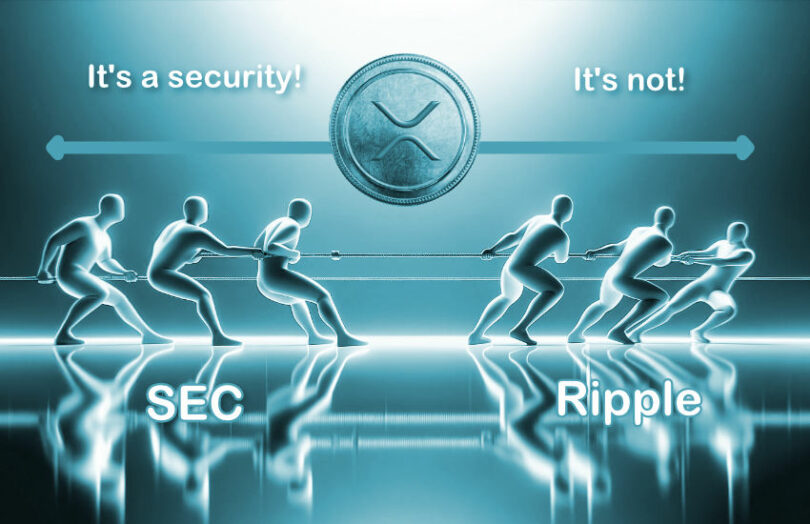In another win for Ripple, the judge in the SEC v Ripple case ordered Ripple to pay a $125 million fine rather than the $2 billion sought by the SEC. Judge Torres made a controversial ruling last July, finding that Ripple’s sales of the XRP token were securities when sold to institutions but not when sold programmatically to retail investors via exchanges.
Yesterday’s ruling related to the penalty for Ripple selling securities to institutions while failing to register the securities. However, the judge also imposed an injunction preventing ongoing sales of XRP without registering as a security. This will impact Ripple’s On Demand Liquidity (ODL) solution. While it’s not Ripple’s sole business model, ODL is a key rationale behind the utility of XRP. There are several potential workarounds, especially given most ODL sales are outside the United States.
ODL is used for cross border payments and reduces the need to hold foreign currencies. A money transfer agent sending Brazilian Real to India would convert Brazilian reals into XRP, and send the XRP to India. On the incoming side, the recipient would convert XRP to rupees. Here, XRP is held for a short period, and some would argue that means the purpose of the sales is not as an investment.
However, one needs to look at the nuances of the judge’s ruling. She issued the injunction because there is a “likelihood that it (Ripple) will eventually (if it has not already) cross the line.”
ODL sales are classified as institutional sales
There was some debate about the injunction’s wording, where the core paragraph states Ripple Labs is “permanently restrained and enjoined from violating Section 5 of the Securities Act”.
The SEC wanted it qualified with a second part, preventing Ripple is from “conducting an unregistered offering of Institutional Sales.” The judge rejected this because the preceding paragraph already covers this. Ripple’s repost was to ask the judge to state that “it does not bar ODL sales, does not bar extraterritorial conduct, and does not bar sales that qualify for exemptions from registration.”
The judge also rejected this request, particularly the reference to ODL sales. She highlighted that Ripple conceded that her previous Order defined Institutional Sales as including sales to ODL customers, but “Ripple attempts to relitigate the Court’s inclusion of ODL transactions in Institutional Sales.” So ODL sales are definitely considered an institutional sale which makes them securities transactions.
A footnote adds color:
“Ripple notes that ‘most of [its] ODL business is outside the United States,’ where its contracts are governed by foreign law, and that Ripple now ensures that ‘all new ODL customers have at least $5 million in total assets, so that they are ‘accredited investor[s]’… Whatever merit these defenses may have, they are not determinative of the question before the Court: whether the SEC has shown a risk of future violations.”
Ripple workarounds
One workaround is the use of a securities exemption for U.S. ODL sales. Several of the exemptions are part of Regulation D, with some clauses including restrictions on securities sales to accredited investors. However, it has a ‘bad actor disqualification’ and the SEC just won a $125 million judgement against Ripple, so it might qualify. Ripple wanted the Court to prevent the SEC treating Ripple as a bad actor. The judge refused because there’s no legal precedent that a judicial waiver was ‘necessary or appropriate’.
There are other exemptions from registering securities, although they may also have similar disqualifications.
So Ripple’s options are to:
- avoid ODL transactions within the United States
- see if it can qualify for an exemption
- register XRP as a security, or
- something else.
One option in the ‘something else’ category would be an offshore DAO running an automated market maker (AMM) that executes the ODL transactions. Coincidentally, in March the XRP Ledger launched an integrated AMM which other protocols have built on top of. If that’s incorporated into a solution, then any ODL client that is based in the United States needs to make XRP purchases or sales via an AMM rather than Ripple.
However, this has unclear legal implications. Any company involved in running the AMM could get sued by the SEC because it is engaging U.S. clients in institutional sales. Given the AMM company is not Ripple, the classification of ODL sales as utility token sales might carry more weight. Or not.
An SEC appeal
The SEC is very likely to appeal the original judgment. It already tried to appeal it, but because the case was still ongoing, the SEC had a higher hurdle to proceed. The judge denied it. Now the case is over, the SEC has a couple of months to lodge an appeal.
It’s not clear that another court will uphold the original court order. It was unorthodox to treat the same instrument, XRP, as a security for institutional sales and not for programmatic retail sales. From a consumer protection perspective, it seems the wrong way around.
If this were to become a legal precedent, it would create a legal mess well beyond cryptocurrencies and keep a lot of lawyers busy. For reasons of certainty and clarity, an instrument needs to be a security or not. A ‘sometimes’ rule seems impractical. With Judge Torres giving one carve out, we already saw Ripple’s logical attempt at another by arguing that ODL sales are not institutional sales of securities. ODL sales certainly look like utility sales. Imagine that messiness scaled out to corporate America. Hence, this fight probably isn’t over yet.
However, time might be on Ripple’s side. There are moves to provide cryptocurrencies with greater regulatory clarity. Plus, there’s a guaranteed change of administration – Harris is not Biden, and Trump is the latest crypto bro. There’s a possibility that the appeal might not be finalized by the time SEC Chair Gary Gensler leaves office. It has taken over 3.5 years to get this far with the lawsuit. Gensler has 20 months left of his five year term.






